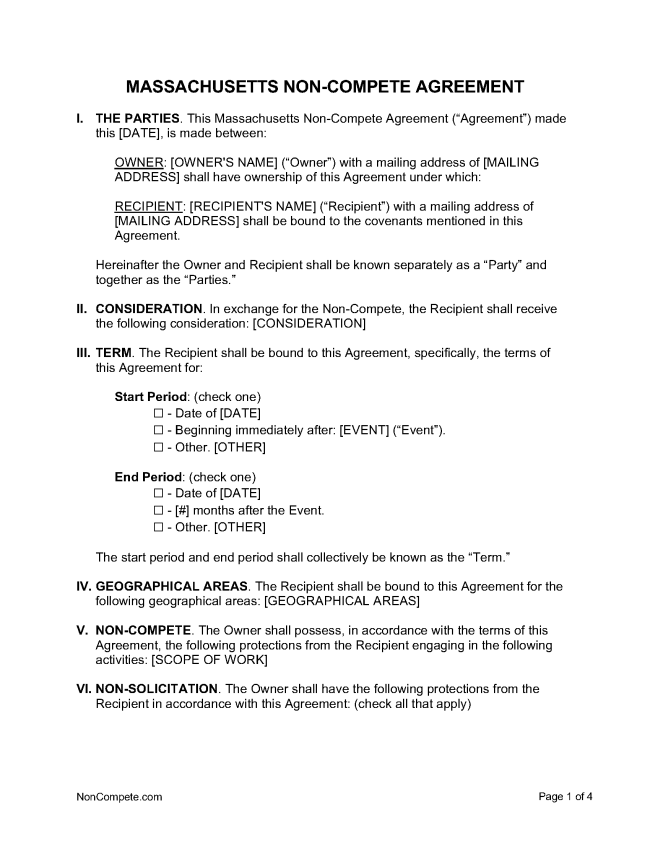A Massachusetts non-compete agreement is a set of contractual terms that prevents someone from pursuing a particular line of work. The Massachusetts Noncompetition Agreement Act covers many topics but only became effective in January 2021, so its effect is unclear because few reported cases have considered it. It also only applies to non-compete agreements coming from employment contracts.
For now, cases that predate the agreement appear to remain good law so long as they do not violate the act.
Table of Contents |
Are Non-Competes Enforceable in Massachusetts?
Yes, but only if they are:
- Necessary to protect a legitimate business interest;
- Reasonably limited in duration and area covered; and
- Not harmful to the public interest.
(Alexander & Alexander, Inc. v. Danahy (1986)).
This definition has been essentially replicated in the Massachusetts Noncompetition Agreement Act, which applies to non-compete agreements arising from employment contracts.
Formalities
For non-compete agreements that come out of an employment contract, the agreement must:
- Be in writing
- Be signed by both the employer and the employee, and
- State that the employee has the right to consult with an attorney before signing.
Mass. Gen. Laws Ann. ch. 149, § 24L(b).
Sale of Business vs. Employment Contract
Although a similar standard is used to decide whether each is enforceable, non-competes arising out of the sale of a business are examined less critically than those arising out of an employment contract. Boulanger v. Dunkin’ Donuts Inc. (2004).
Reasonableness
For non-compete agreements arising out of employment contracts, reasonableness requires
- Agreements that only cover territory where the employee worked within the last two years of employment are presumed reasonable. Mass. Gen. Laws Ann. ch. 149, § 24L(b)(v).
- Agreements that only cover activities or services the employee performed in the last two years are presumed reasonable. Mass. Gen. Laws Ann. ch. 149, § 24L(b)(vi).
Courts will sometimes allow non-compete agreements that cover a broad geographic area. For example, in Marine Contractors Co., Inc. v. Hurley (1974), the Massachusetts Supreme Court allowed a non-compete agreement that covered a former employee doing boat repair work within 100 miles of Boston because this area coincided with the company’s service territory.
Because good will covers the reputation of a business and its relationship with customers, it can only exist in places where the business operates, and geographic restrictions that cover broader areas are generally unreasonable. (All Stainless, Inc. v. Colby (1974)).
Protectable Interest
Good will, meaning the reputation of a business and its relationship with customers, is a common interest protected by a non-compete agreement found in the sale of a business. (Wells v. Wells (1980)).
Other interests that can be protected by non-compete agreements in the sale of a business include confidential trade secrets and information that does not meet the Massachusetts definition of a trade secret. Protection from regular competition is not a legitimate business interest. (Novelty Bias Binding Co. v. Shevrin (1961)).
Trade secrets, information that is confidential but not a trade secret, and good will are also legitimate protectable interests for non-competes arising out of employment contracts. Mass. Gen. Laws Ann. ch. 149, § 24L(b)(iii).
Public Interest
Whether a non-compete agreement harms the public interest and is thus unenforceable depends on several factors, including:
- Whether the industry involved is competitive or if enforcing the agreement could help create a monopoly;
- Whether the restrained party signed the agreement freely and was aware that the agreement could prevent them from working in the future;
- Whether other competitors in the industry were aware of the non-compete agreement.
Alexander & Alexander, Inc. v. Danahy (1986).
Prohibited Workers
Contractual provisions that restrict the right of physicians to practice are unenforceable. Mass. Gen. Laws Ann. ch. 112, § 12X.
Unlike some other states, Massachusetts also prohibits non-compete agreements requiring fixed payments, called “liquidated damages,” if a physician practices in a particular location or within a certain period. (Falmouth Ob-gyn Associates inc. v. Abisla (1994)).
Attorneys cannot enter non-compete agreements, whether found in employment contracts or partnership agreements, that limit their right to practice in the future. This does not apply to agreements concerning retirement benefits or reasonable restrictions found in contracts for the sale of a law practice. Rule 5.6(a), Massachusetts Rules of Professional Conduct.
Case settlements that limit an attorney from practicing are unenforceable. Rule 5.6(b), Massachusetts Rules of Professional Conduct.
Non-compete agreements are not enforceable against:
- Employees covered by §§ 201 – 219 of the Fair Labor Standards Act
- Undergraduate or graduate students doing an internship
- Employees who have been terminated or laid off
- Employees 18 or younger
Mass. Gen. Laws Ann. ch. 149, § 24L(c)
Terminating an Employee
Non-compete agreements are not enforceable against employees terminated without cause or laid off. Mass. Gen. Laws Ann. ch. 149, § 24L(c).
Burden of Proof
The party trying to enforce a non-compete agreement has the burden of proof. Boulanger v. Dunkin’ Donuts Inc. (2004).
Continued Employment (consideration)
It is unlikely that continued employment is adequate consideration to support a non-compete agreement. Mass. Gen. Laws Ann. ch. 149, § 24L(b)(ii) states that, for non-compete agreements that begin after employment but are not associated with termination, the agreement must be supported by “consideration independent from continued employment.”
Maximum Term
Non-compete agreements arising out of employment contracts generally cannot exceed one year unless the employee violated a fiduciary duty to the employer or unlawfully took property belonging to the employer, in which case the agreement may be no longer than two years. Mass. Gen. Laws Ann. ch. 149, § 24L(b)(iv).
For a non-compete agreement arising out of the sale of a business, Alexander & Alexander, Inc. v. Danahy (1986) upheld a five-year agreement.
Blue Penciling (allowed)
Courts may, but do not have to, modify a non-compete agreement to make and valid and enforceable to the extent necessary to protect legitimate business interests. Mass. Gen. Laws Ann. ch. 149, § 24L(d).
